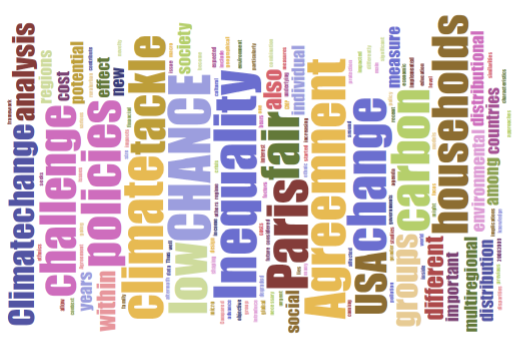CHANCE
|
Climate cHange
mitigAtioN poliCies and Equality: distributional implications for |
||
|
The overarching goal of CHANCE is to contribute to bridging the gap between economic and social goals, through enhancing our understanding of how to foster socially fair and economically efficient climate mitigation policies. CHANCE will be implemented through a novel approach integrating Computable General Equilibrium and Microsimulation models. |
||
|
Climate change and inequality are two of the most important threats that humankind face in the 21st century. To address these two challenges, it is necessary to design and implement policies aimed at favouring a transition towards a low carbon society that, at the same time, help reduce inequality between and within countries. Indeed, if climate change mitigation policies tend to increase the gap between rich and poor households or reduce the affordability of energy services for the poorest households and increase energy poverty, there is a risk of the associated mitigation measures being rejected by the public and policy makers, and therefore, any attempts to tackle climate change would be unsuccessful. Our best chance of achieving a low carbon economy goes hand in hand with designing policies that are effective in promoting a better distribution of impacts. In this context, the overarching goal of CHANCE is to contribute to bridging the gap between economic and social goals, through enhancing our understanding of how to foster socially fair and economically efficient climate mitigation policies. The specific research objectives of this project have not been addressed in the past and, in this sense, the project will contribute to enhance EU scientific excellence by consolidating novel multidisciplinary research. CHANCE will reduce this gap in the literature through two specific relevant multi-regional case studies in settings where climate, energy policies and trade agreements are at the core of the current political debate: first, relations between Mexico and the USA (outgoing phase) and second, relations within the 28 Member States of the European Union (return phase). Through these analysis, identifying the factors which induce regressive policies, CHANCE could guide improvements in the design of policies |
||
|
Start date: 13 January 2019 |
End date: 12 January 2022 |
|
|
Call:H2020-MSCA-IF-2017-GLOBAL |
||
|
Partners in CHANCE: |
||
|
BC3 Basque Centre for Climate Change Massachusetts Institute of Technology (MIT) : Partner organisation for the outgoing phase |
||
|
Key people involved in BC3: |
||
| Mikel Gonzalez-Eguino (BC3 supervisor) | ||
|
|
||
 |
CHANCE received funding from the Horizon 2020 - The Framework Programme for Research and Innovation - European Commission. Grant Agreement number 796650. |
|

